Probiotics For Dogs With IBD: Everything You Need to Know + Our Top Picks
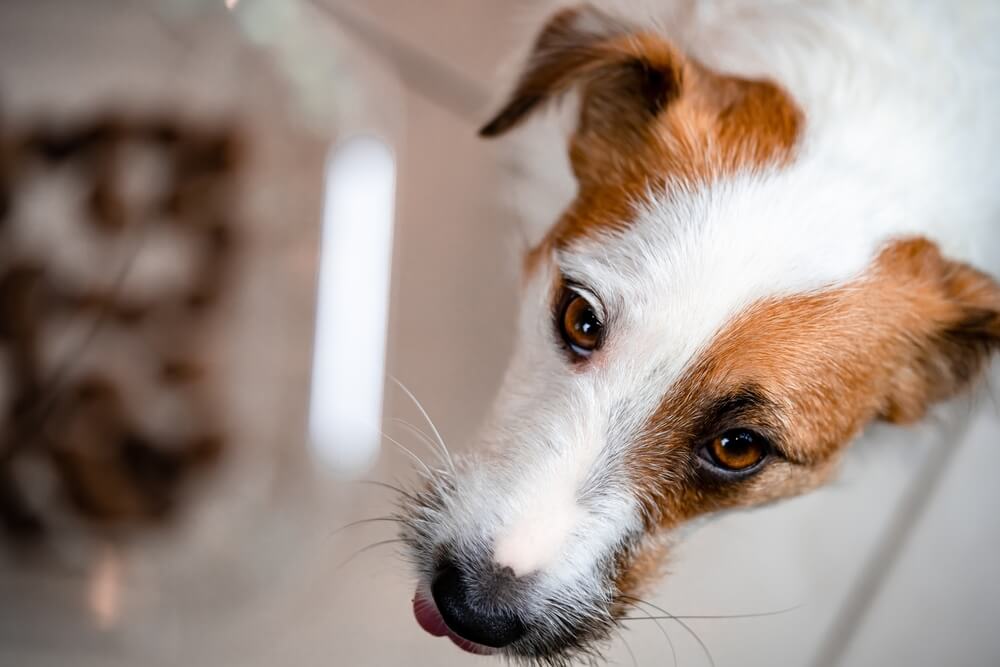
Table of Contents
What are the Best Probiotics for Dogs With IBD?
- Best Overall Probiotics for Dogs with IBD: Honest Paws Pre+Probiotics
This is our top pick when it comes to probiotics for dogs suffering from IBD, thanks to its optimal blend of ingredients. - Best Natural Probiotics for Dogs with IBD: Open Farm’s Probiotic Supplement Chews
Uses vet-recommended formulas with only 100% traceable and functional ingredients. - Most Delicious Probiotics for Dogs with IBD: PetLab Co. Probiotics for Dogs
This delicious blend of beneficial bacteria offers digestive support and promotes a healthy microbiome in your dog’s body. - Best Chewable Probiotics for Dogs with IBD: Doggie Dailies Probiotics for Dogs
These duck-flavored soft chews are made with real duck and help boost your dog’s immunity and digestive health. - Most Diverse Probiotics for Dogs with IBD: PetHonesty Digestive Probiotic Soft Chews
Available in three flavors, this probiotic is easily digestible as it contains no wheat, GMOs, corn, soy, sugar, and harsh preservatives. - Best Multiuse Probiotics for Dogs with IBD: Pet Naturals Daily Probiotic for Dogs
This probiotic also contains prebiotics that improves your dog’s gut health and offers several benefits, such as boosting their immunity.
Are Probiotics Good for Dogs With IBD?
Yes, probiotics for dogs with IBD are good.
Probiotics can help with GI tract conditions, especially in dogs with IBD, by working on multiple levels. However, it is essential to remember that probiotics for dogs with IBD are part of the treatment, they are not a treatment per se.
Probiotics are defined as live microorganisms (bacteria and yeasts) that provide health benefits to the host. In simple words, probiotics are the “good” GI bacteria. The goal of the probiotics is to keep the levels of “good” bacteria high and prevent the “bad” bacteria from overpopulating the GI.
There are several benefits of giving your dog probiotics:
- Digestion. Probiotics are known to improve your dog’s digestive system (including the GI tract) overall. This not only benefits their digestion but also makes it easier for the dog to undergo weight loss, thanks to the beneficial bacteria.
- Immunity. With improved gut health, gut bacteria are able to improve your dog’s immune response to various ailments. This not only improves gastrointestinal health but also strengthens your dog’s small and large intestines.
- Inflammation. Similar to potent veterinary medicines, probiotics are known to reduce inflammation in your dog – especially canine inflammatory bowel disease, intestinal inflammation, and swelling of the gastrointestinal tract.
- GI Problems. Thanks to various clinical trials, probiotics are known to improve digestion as they are able to create a healthy microbiome in the digestive tract, large intestines, and small intestines, even in large and active breeds like boxers and collies.
- Nutrient Absorption. Since probiotics are able to reduce colitis, your dog’s body is able to better absorb nutrients. This improves their health overall and reduces the need for intrusive endoscopic procedures and biopsies that might cause discomfort to your pet.
- Eliminate Toxins. Probiotics, similar to internal medicines, are able to repair your dog’s mucosal lining and therefore are efficiently able to eliminate microbial toxins from your dog’s body.
Can Probiotics Make Dog IBD Worse?
Yes, probiotics for dogs with IBD can make things worse. However, the only situation in which this is possible is if you expect the probiotic to be the cure and refuse other treatments.
Before deciding to add probiotics to your dog’s food or give them as chews, you need to talk to your vet. This is because probiotics alone cannot manage IBD.
After carefully examining your dog and considering the pathologist’s histological findings, the vet will craft a treatment plan and recommend the right type of probiotic.
How do Probiotics for Dog IBD Work?
A recent pilot study showed that probiotics promote overall improvement in dogs with idiopathic IBD when combined with immunosuppressive treatment.
Namely, the group of dogs receiving both immunosuppressive drugs and probiotics improved more than the group of dogs receiving conventional immunosuppressive drugs alone.
Studies also show that probiotics decrease the incidence of stress-related diarrhea in dogs and cats. They also show that prolonged use of dog probiotics is associated with better results, and sometimes the clinical signs return upon discontinuation of the probiotics.
The Best Probiotics for Dog IBD Reviewed
There are many probiotics for dogs with IBD. To help dog owners find the right product for their pets, we have reviewed some of the bestprobiotics for dogs with IBD on the market.
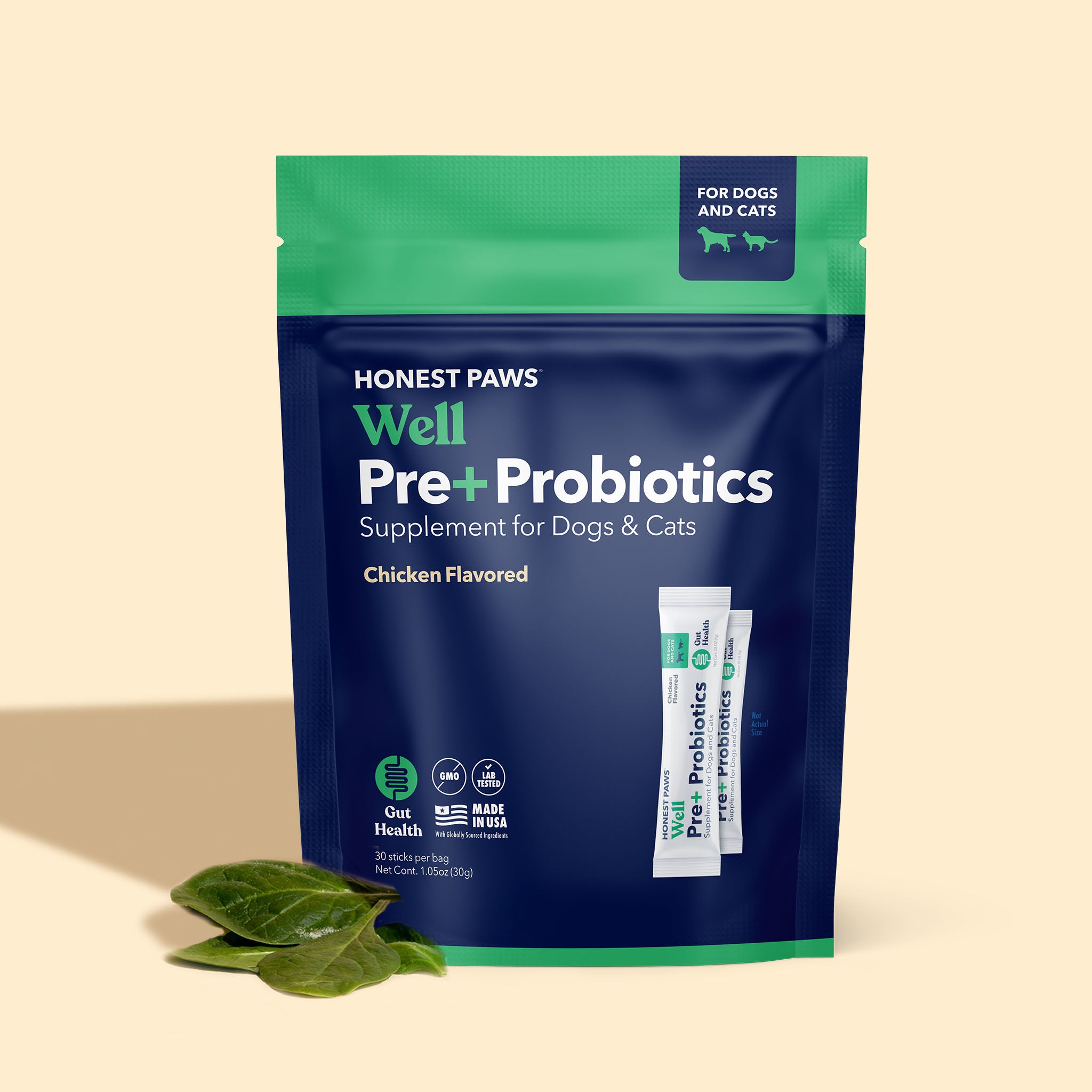
Summary: This product is specially formulated with both dog probiotics and prebiotics. As a result, there is less growth of harmful gut bacteria and, therefore, lesser chances of GI tract issues (enteritis, for example). This product helps build intestinal microbiota consisting of beneficial microbes that help with digestive issues. This product has been custom-formulated and therefore will work great with more dog breeds.
Recommended Uses: Digestive support, immunity-boosting
Ingredient Analysis:
- Inulin: Excellent source of dietary fiber that supports the gut’s microbiome
- Solarplast: Spinach leaf extract that promotes cellular restoration
- Rice Hull: Adds fiber, but some dogs are known to be allergic to it
Probiotics Strains: Bacillus subtilis, Bacillus coagulans, Bifidobacterium animalis, Bifidobacterium longum, Lactobacillus acidophilus, and Lactobacillus plantarum
- Manages diarrhea and constipation
- Strengthens immune system
- Produces natural antibodies
- Boosts overall well-being
- Reduces IBD symptoms
- Often out of stock due to high demand
Review: These probiotics for dogs with IBD help with healthy aging and is able to keep your dog active. With 6 strains of probiotics, this is a very beneficial product for your dog.
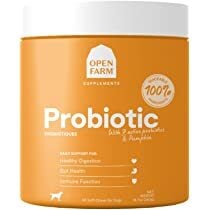
Summary: Consistent inflammation of a dog’s colon or digestive tract is a symptom of inflammatory bowel disease (IBD). Save your dogs from that debilitating health problem by giving them Open Farm’s Probiotic Supplement Chews. From irregular digestion to serious conditions like IBD, each Probiotic soft chew from Open Farm was made to help support your dog’s normal gut flora and bowel movement using vet-recommended formulas with only 100% traceable and functional ingredients. Get 20% off your first auto-ship order with code VET20.
Recommended Uses: Stomach/intestinal health, immune support, and allergy relief for dogs
Ingredient Analysis:
- Pumpkin: Pumpkin is a good source of fiber and helps support digestive health.
- Ginger: Ginger has natural anti-inflammatory properties and is high in antioxidants, hence aiding healthy digestion.
Probiotics Strains: Lactobacillus Acidophilus, L. Casei, L. fermentum, L. Reuteri, L. Plantarum, Bifidobacterium bifidum, and Bacillus coagulans. These probiotics help support healthy digestion and gut health.
- 20% off your first auto-ship order with code VET20
- Helps promote healthy digestion & gut health
- Supports normal gut flora & bowel movement
- Boosts healthy immune function
- Has 90 delicious soft chews
- 100% traceable ingredients
- No significant cons
Review: Due to its numerous advantages to a dog’s digestive health, this recipe has received an above-satisfactory review from many dog owners on Amazon, earning 4.8 out of 5 stars. To quote one happy customer, “Since we added these to our golden’s daily routine, he hasn’t had any bowel issues. I definitely recommend.”
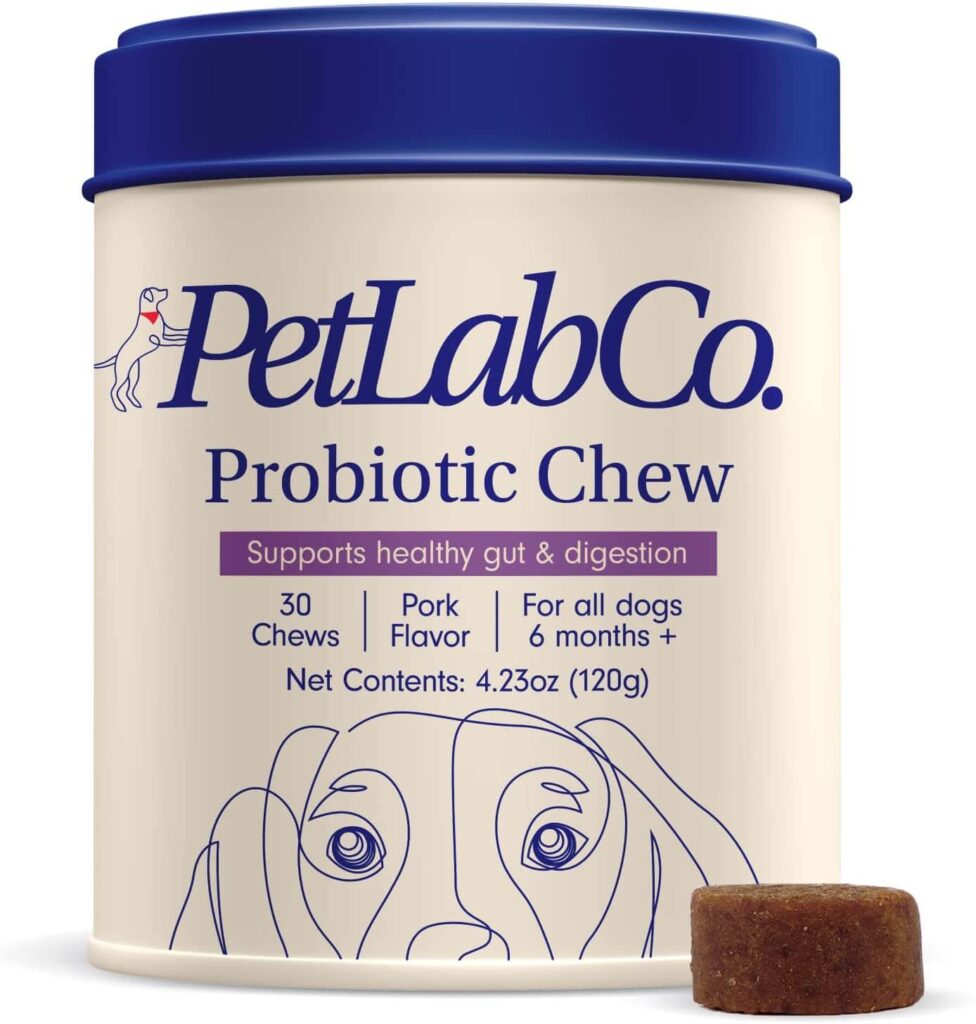
Summary: If your dog suffers from itchy skin, paw licking, head shaking, or loose stools, this product is exactly what you need. Manufactured using premium ingredients in FDA-registered facilities, this probiotic helps your dog build immunity against harmful forces. Made with a mouth-watering pork flavor, this will be a hit even with fussy eaters.
Recommended Uses: IBD help, digestive support, and Immune response
Ingredient Analysis:
- Agave (Inulin): Helps boost digestive properties and acts like an efficacious prebiotic
- Honey: A very potent antioxidant, honey helps boost your dog’s immunity
- Salmon Oil: Contains fatty acids which reduce inflammation and relieve dog joint pain.
- Pumpkin: Adds dietary fiber and supports the growth of healthy bacteria and yeasts
Probiotics Strains: Bacillus coagulans, Lactobacillus reuteri, Bifidobacterium bifidum, Lactobacillus brevis, Lactobacillus casei, Bifidobacterium longum, Lactobacillus plantarum, and Streptococcus thermophilus
- Maintains proper gut flora
- Perfect for dogs of all sizes and breeds
- Imparts normal immune response
- Contains beneficial bacteria
- Optimizes skin health
- Single-strain probiotic formula
Review: These probiotics for dogs with IBD are not only made using premium ingredients, but it is also easy to chew, making it perfect for dogs of all sizes and breeds. It is manufactured in the USA.
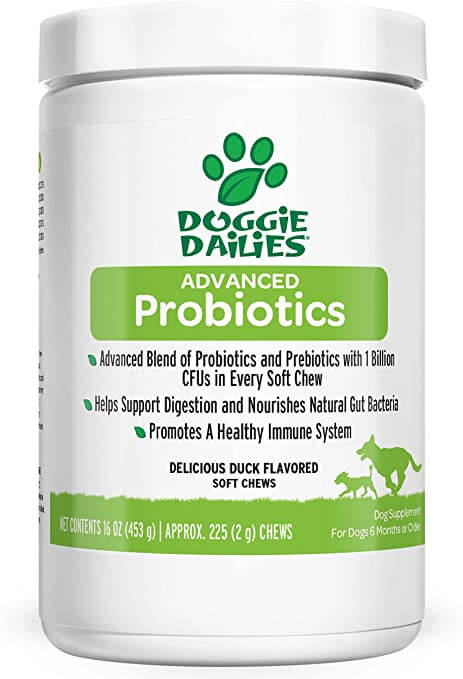
Summary: Available in two delicious flavors, this probiotic works well for dogs suffering from IBD. The product is free from harmful strains of salmonella and e.coli, which could cause more harm to your pet. This product is great for dogs of all breeds and sizes as it helps maintain a healthy GI tract and improves the absorption of nutrients during the process of digestion.
Recommended Uses: Digestive health, builds immunity, gut flora maintenance
Ingredient Analysis:
- Duck: The main source of protein that binds the chew together
- Sweet Potatoes: Contain fiber and carbohydrates
- Carrots: Contain antioxidants and other nutrients that benefit your dog
Probiotics Strains: Lactobacillus acidophilus, Lactobacillus plantarum, Lactobacillus fermentum, Lactobacillus brevis, and Lactobacillus lactis
- Grain-free product
- Supports digestive function
- Maintains proper gut flora
- Perfect for dogs of all sizes and breeds
- Money-back guarantee
- Might lead to an allergic reaction in some dogs
Review: These probiotics for dogs with IBD are tested by a third-party lab and therefore considered safe for daily use. It improves your pet’s health and digestion and relieves symptoms of IBD.
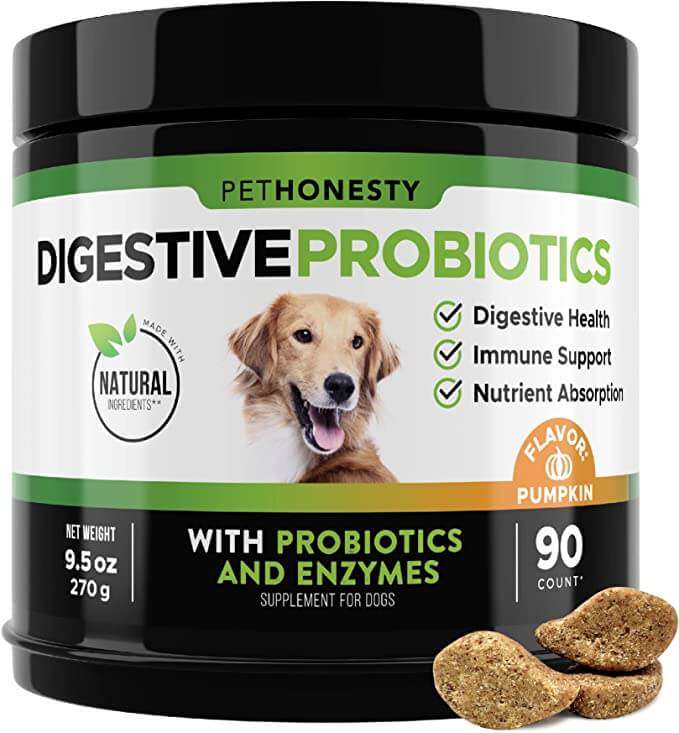
Summary: With 6 Billion CFUs, this probiotic is a lot more beneficial in comparison to other similar products. It is made using high-quality ingredients and contains zero wheat, GMOs, corn, soy, sugar, and harsh preservatives. Additionally, this product balances your dog’s intestinal microflora and also helps to keep the pH levels in their body under check. They are made using a delicious natural flavoring that keeps your fussy pet interested.
Recommended Uses: IBD support, builds immunity, nutrient absorption
Ingredient Analysis:
- Carrot: Offers antioxidants and fiber that improve digestive function
- Sweet Potatoes: Contains fiber which leads to a better digestion
- Flaxseed: This contains several vitamins and minerals that boost immunity
Probiotics Strains: Lactobacillus acidophilus, Lactobacillus lactis, Lactobacillus plantarum, Lactobacillus brevis, Lactobacillus fermentum, Bifidobacterium bifidum, and Enterococcus faecium
- Grain-free product
- Optimizes skin health
- Supports digestive function
- Maintains proper gut flora
- Imparts normal immune response
- Might lead to an allergic reaction in some dogs
Review: These probiotics for dogs with IBD are available in the form of a soft chew and therefore is easy to administer to your dog. It is manufactured in the USA in a GMP-certified facility.
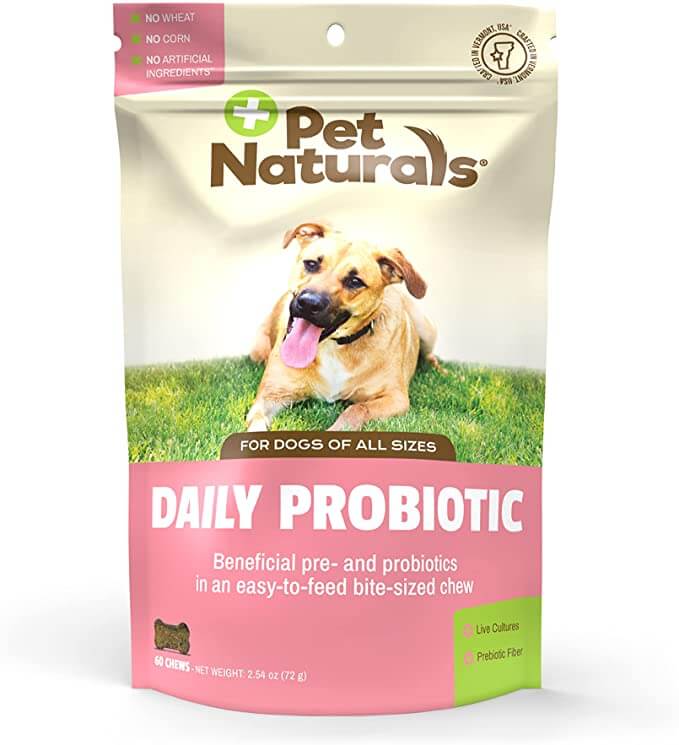
Summary: This daily probiotic is formulated along with prebiotics which helps create a beneficial gut environment within your dog. This not only improves digestion and nutrient absorption but also relieves various symptoms of IBD. Additionally, it also provides your pet with a healthier and shinier coat and counters any signs of an allergy. Finally, the product does not contain any corn, wheat, and artificial ingredients.
Recommended Uses: GI tract support, allergy care, skin & coat health
Ingredient Analysis:
- Natural Duck Flavor: This imparts a delicious taste to the chew, especially for picky eaters
- Oat Flour: Offers various nutrients and keeps your pet healthy
- Glycerin: Helps to improve the digestive system and helps with nutrient absorption
Probiotics Strains: Bacillus coagulans
- Supports digestive function
- Maintains proper gut flora
- Imparts normal immune response
- Builds immunity
- Relieves IBD symptoms
- Single-strain probiotic formula
Review: These probiotics for dogs with IBD are perfect for all dogs, irrespective of their breed or size. It can be consumed daily after following the instructions on the back.
How Long does it Take for Probiotics to Work in Dogs with IBD?
The average time it takes probiotics to work is around 2-4 weeks. However, the time probiotics need to start working depends on the IBD’s form and severity. However, in most cases, it would be irrational to expect immediate results.
Good bacteria need time to start working, and you might be able to see an improvement in your dog’s symptoms a few weeks after starting to use the probiotics for dogs with IBD.
How do I Use Probiotics for My Dog’s IBD?
Considering its complex etiology, inflammatory bowel disease in dogs requires a multimodal therapy strategy, including food changes, dietary supplements, and medications. So, probiotics for dogs with IBD should be combined with other approaches.
IBD enteropathies are generally food, antibiotic, or steroid-responsive. However, if the IBD enteropathy is refractory even after immunosuppressive therapy, it is classified as idiopathic inflammatory bowel disease (idiopathic IBD).
The use of probiotics for dogs with IBD, GI inflammation issues, and enteropathies is a hot topic at the moment. Many studies are exploring the effects of probiotics on the dog’s overall GI health. With probiotics covered, let’s review the other aspects of managing inflammatory bowel disease in dogs.
- Food Trial. A food trial is the first choice when managing dogs with inflammatory bowel disease. The goal of the food trial is to exclude the possibility of underlying food allergies and sensitivities. During this phase, the dog needs to be fed commercially available diets made of hydrolyzed proteins or homemade diets including novel proteins. For example, if your dog ate a beef diet and has never eaten fish, the novel diet should use fish as the primary protein source. Around one-half of the dogs with chronic diarrhea respond positively to these food switches. However, they are time-consuming, and pet owners often do not stick to the strict feeding regimens veterinarians recommend.
- Antibiotics. Every dog with chronic diarrhea or some form of GI inflammation will eventually be put on an antibiotics treatment. They are supposed to reduce inflammation and fight off pathogens. One of the most commonly used anti-diarrhea antibiotics is metronidazole.
- Vitamin B12 Supplements. Chronic GI inflammations result in impaired vitamin B12 absorption. Considering this vitamin’s crucial role in maintaining GI health, the vet will probably prescribe oral vitamin B12 products or injections.
- Fiber Supplements. Fiber supplements (inulin, psyllium) containing soluble fiber sources can be beneficial in the treatment of canine IBD. This is because they can help restore the gut microbes and promote healthy intestinal motility and fecal density. Such fiber-based supplements or prebiotics are also important when using probiotics as they serve as food sources for good bacteria.
- Steroids. When nothing else works, the vet will prescribe steroids (usually ) in high doses as a form of immunosuppressive therapy. Steroids keep the immune system from producing an exaggerated inflammatory response. This is because in dogs with IBD, the immune system overreacts. However, it should be noted that the use of high steroid doses is associated with many side effects, not just when treating canine IBD but in general.
- Fecal Transplants. Fecal transplant is a fancy term for a simple treatment – poop from healthy dogs is given to dogs with GI conditions. The concept is simple as well – reintroducing “good” bacteria in dogs with IBD-triggered bad bacteria. The fecal transplant comes in two forms – an enema and an oral capsule. Each option has its pros and cons, and which one is best for your dog is something you need to discuss with your trusted vet.
- Formulated to deliver digestive support, promote healthy yeast production, and encourage a normal immune response.
- Contains healthy ingredients and 8 strains of beneficial bacteria that work as a digestive aid, optimize skin health, and support coat comfort.
- Easy to use on either young puppies or senior dogs.
How do I Choose the Best Probiotic for Dog IBD?
Here is a short review of what you need to consider when choosing probiotics for dogs with IBD:
- CFUs (Colony-Forming Units). Most dogs usually need between 1 and 4 million good bacteria per day. Large and giant dogs can take probiotics with 5 million CFU. Choose probiotics for dogs with IBD within this number range.
- Various Microorganisms. It is not just the number of bacteria that matters but also the type of bacteria. You should opt for probiotics for dogs with IBD containing several different microorganisms.
- Added Ingredients. Good probiotics for dogs with IBD should contain synergistic ingredients like prebiotics, vitamins, minerals, digestive enzymes, and antioxidants.
- Potency and Shelf Stability. Probiotics for dogs with IBD contain live bacteria, which is why you need them to be stable. If they start decaying and lose their potency, your dog will not benefit from the supplementation.
- Transparent Brand. Probiotics for dogs with IBD are classified as nutraceuticals which means their production and labeling are not as strictly regulated as is the case with pharmaceuticals. Therefore, it is critical to choose a trustworthy and reliable probiotic brand.



















